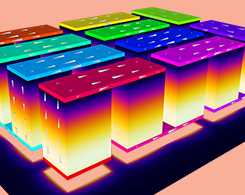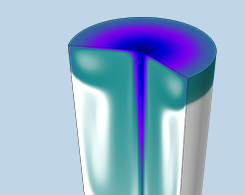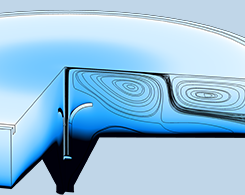Fluid & Heat Blog Posts

FEM vs. FVM
Finite element methods, finite volume methods, or a hybrid approach: Which is the best choice for CFD? It depends on the fluid flow problem you’re trying to solve.

Using Discontinuous Meshes for Conjugate Heat Transfer Modeling
You can use different discontinuous meshes in neighboring domains in COMSOL Multiphysics®. This capability comes in handy, particularly when modeling conjugate heat transfer problems.

Understanding Classical Gray Body Radiation Theory
Imagine how efficient an incandescent lamp with an infrared suppressing black body filament would be. Alas, classical gray body radiation theory tell us this “dream lamp” is an impossibility…

3 Approaches to Modeling Moving Loads and Constraints in COMSOL®
Learn 3 ways to model moving loads and constraints in COMSOL Multiphysics®: using variables, interpolation functions, and paths imported from CAD geometries.

Improving Architectural Designs with Building Physics Simulation
Building physics simulation can help engineers develop more energy-efficient architectural designs. We talked to Built Environments, Inc. to get a few examples of how.

Studying the Peltier and Seebeck Effects in Thermoelectric Devices
We go over 2 key concepts in themoelectricity, the Seebeck and Peltier effects, and how to account for them when simulating heating and cooling in thermoelectric devices.

How to Model Sparging in COMSOL Multiphysics®
Sparging, the process of bubbling a gas into a liquid, is seen most notably in carbonation, such as for soda and seltzer water. This mass transfer process can be modeled in COMSOL Multiphysics®.

How to Place Inlet and Outlet Boundary Conditions in CFD Simulations
When setting up fluid flow simulations, at what distance can we apply boundary conditions without interfering with the process? Here, we discuss how to place inlet and outlet boundary conditions.
